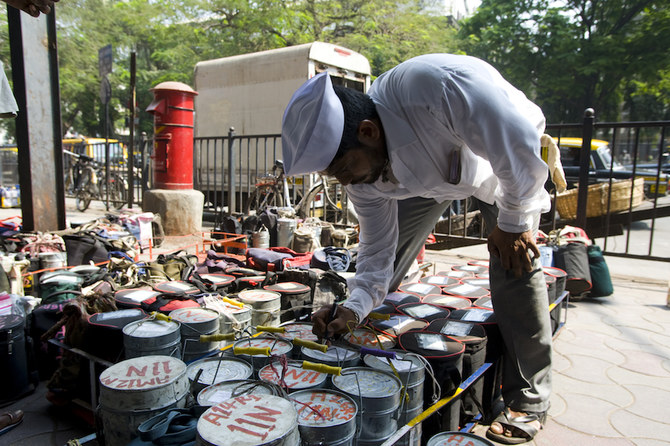MUMBAI: A 130-year-old delivery network that has fed Mumbai for decades could collapse after the coronavirus lockdown rendered thousands of its employees jobless.
The delivery system was the primary source of income for 5,000 men who are mostly semi-literate and earned around INR15,000 a month ($200) by lugging more than 200,000 lunch boxes across the city every day, irrespective of rain, thunder or riots, earning themselves the moniker of dabbawalas or the “ones who carry a box.”
But with India imposing a nationwide lockdown in March, the state government of Maharashtra, of which Mumbai is the capital, was forced to shut down all public transport and essential services as well.
“After the lockdown in March, our service came to a standstill since the suburban trains, Mumbai’s lifeline, came to a halt,” Raghunath Medge, a third-generation dabbawalla and president of the Mumbai Dabbawala Association, told Arab News on Monday. “Though some offices have opened now, we cannot function without trains.”
Instantly recognisable in their white uniforms paired with the traditional Gandhi caps, the dabbawalas were the envy of delivery giants such as FedEx and Amazon, with billionaire businessman Richard Branson reportedly travelling with a group of them to deliver tiffins to his employees at Virgin, Mumbai, to learn their operational secrets.
However unlike Uber Eats or Swiggy, which connect customers with their restaurants of choice, the food delivered by the dabbawalas is always homemade.
The process would see teams of 40 to 60 men collect the “dabbas” from the registered homes by 9 a.m. before carting them off in cycles and handcarts to the nearest railway station, where the boxes are sorted and deposited in wooden crates in the luggage van of trains.
At the other end, the next batch picks, sorts and delivers these boxes to the offices mostly in South Mumbai, after which the empty boxes are returned to their owners by 6 pm through the same system.
Medge said Mumbaikers preferred the service as they could “relish on homemade food at a reasonable price,” with charges ranging from $11-16 per customer, depending on their location.
Mistakes were a rarity, he added, a fact corroborated by a 2010 Harvard Business School study which said that the dabbawalas made fewer than 3.4 errors per million deliveries.
However, the COVID-19 outbreak has had a disastrous effect on the lives of these delivery boys.
“Dabbawalas were paid salaries only up to March and after that our workers have been unable to collect their payment from customers – since housing complexes are not allowing their entry into buildings due to fear of COVID-19,” he said.
Most of the dabbawalas are from Pune, which is a three-hour drive from Mumbai. Since the lockdown, more than 4,000 have returned to their villages in Junnar, Ambegaon, Maval, Mulshi, Rajgurunagar, Sangamner and other places in the Sahyadri-Western Ghat hilly region, Medge said.
“They went by whatever vehicle they could get hold of— motorbikes, scooters, private cars and even cycles. They have been doing odd jobs, working in their farms, or others’ fields. Cyclone Nisarga also affected agriculture.”
Those who stayed back have been subsisting on food items supplied by charitable organisations, while facing the grim prospect of sourcing money for rent and essential medicines.
One of the worst affected dabbawalas is Rambhau Jadhav, a 59-year-old resident of the Malad suburb and a father of four sons who lost one to COVID-19 recently.
“My son Santosh, 39, was admitted to a municipal hospital after he developed a fever,” he told Arab News. “His wife was also admitted. Without informing us, my son, whose condition was deteriorating, was taken to Nair Hospital where he died in the ambulance on June 24. We were informed of his demise in the evening.”
Santosh is survived by his wife, who is now out of quarantine, and their five-year-old son.
The conditions are no better for those who have returned to their villages either.
“I came with my family in March itself as no job meant I could not pay my rent for my Jogeshwari home in Mumbai,” Pandurang Jadhav, 38, told Arab News by phone from his village in Maval, Pune district. “Here, we do get rations from our Association which helps us stay alive. My family includes my wife, three kids, my mother and a brother who is very ill.”
The dabba service was conceptualized by a Parsi banker who wanted to have home-cooked food and assigned the task to an unemployed man to deliver his lunch to him at work.
The idea caught on and, in 1890, Mahadeo Havaji Bachche, a migrant laborer from Maval who was working as a loader at Bombay Port, began a lunch delivery service with nearly 100 men.
The service became an instant hit as the city lacked canteens or eateries in those days and rail commuters found it difficult to carry lunch boxes in crowded trains.
Bachche unionized the dabbawalas and, in 1956, registered it as a charitable trust under the title of Nutan Mumbai Tiffin Box Suppliers Trust.
Thirty years later, they came to be known as the Mumbai Tiffin Box Suppliers’ Association.















